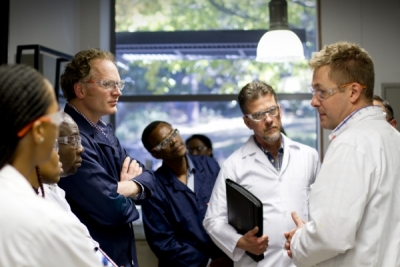DST-Netherlands Workshop


CeBER research officers, postdocs and PhD students gave DST delegates and visiting Netherlands academics a showcase of the CeBER research areas as well as a tour of the CeBER lab facilities.
DST-Netherlands Workshop Report back by Dr Sarah Jones
In 2014 South Africa’s Bioeconomy Strategy was developed, and is today one of only 5 in the world. This puts us in an excellent position moving forward in the development of bio-based industry and technology. The implementation of the bioeconomy will address some of the social, economic and environmental challenges facing South Africa and the world. The Department of Science and Technology (DST) aims to invest in technologies that promote job creation, wealth creation and a transformed society in South Africa. A team at the Centre for Bioprocess Engineering Research (CeBER) at UCT are conducting a feasibility report on potential bio-based products that meet the requirements set by the DST and that can be produced in South Africa. These products must have market drivers, be needed by industry and have feedstocks available in South Africa. The technology required to produce them should be available or be developed in the near future.
Relationships with the Netherlands, nurtured through their NWO (the Netherlands Organisation for Scientific Research), have been growing over the years in the field of biotechnology, and further collaborations have been set up as part of South Africa’s push towards a bioeconomy. On the 7th April a workshop was held for academic, industry and government representatives from both South Africa and the Netherlands. Here, opportunities for the SA bioeconomy and research linked to this were discussed as well as the enablers and impediments to growth in the biotechnology industry. The need for collaboration between research institutions, as well as communication between industry and research was strongly emphasised. Three bioprocesses were put forward for development, given the current collaboration with the Netherlands and available DST funding. These included projects in algal biotechnology championed by CeBER, projects in the paper and pulp industry and the sugar industry. Further projects in biochemical production, biomaterial production and waste innovations were suggested for the future, and more will be selected based on the feasibility studies currently being conducted, albeit in the light of limited budget in the current budgeting cycle of the DST.
A visit to CeBER by delegates from the workshop, including DST representatives and academics from the Netherlands, followed on the 8th April. This included a showcase of the research areas at CeBER by research officers, postdocs and PhD students. A tour of CeBER laboratories with its wide range of on-going projects and world-class facilities was also conducted.
We are grateful for the opportunity to be part of an interesting and constructive workshop with the DST, NWO and fellow scientists from the Netherlands and SA. We look forward to continued good relationships and fruitful progress towards and sustainable bioeconomy in South Africa.
